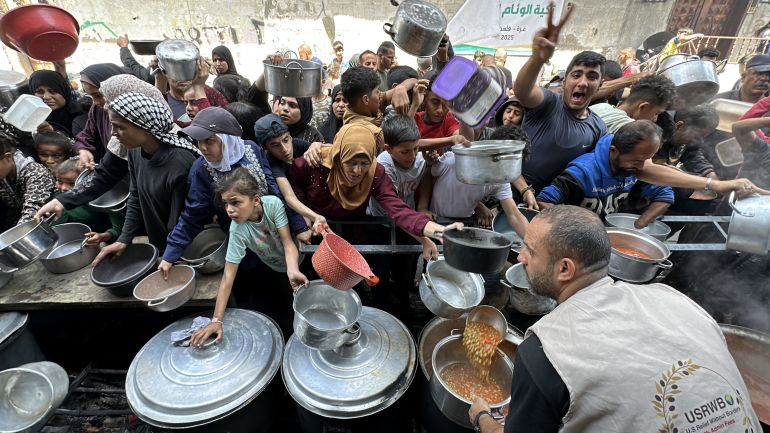Public hearings on Israel’s obligations regarding allowing United Nations organizations and other relief organizations to work in the Palestinian territory it occupies were concluded by the International Court of Justice (ICJ) on May 2.
Since Monday, a panel of judges has heard oral arguments from 40 nations, including China, France, Indonesia, Pakistan, Russia, and the United Kingdom.
The UN General Assembly requested a decision in December, so the court will likely go through months of deliberation before making a decision.
Since starting a genocidal war against Gaza on October 7, 2023, many of the participating states have condemned Israel for severely restricting humanitarian aid to the region.
Israel has completely stopped providing any kind of aid, including food or medicine, for the past two months, accelerating the famine and medical crises.
What can we learn from the hearings in particular:
The Palestinians as a people are threatened by starvation.
Israel, as an occupying power, was generally agreed to be required to permit aid organizations to aid the people it occupy, particularly in Gaza, which Israel is also bombing.
According to Juliette McIntyre, a legal scholar at the University of South Australia, Israel’s violations of human rights have weakened.
She noted that nearly all of the states that spoke at the hearings made it clear that Palestinians need humanitarian aid in order to ensure their survival, safeguard their right to eventual self-determination, and protect the UN system as a whole and the treaties that support it.
She stated in a nutshell that the majority of states concur that Israel should not be able to starve the civilians under its control or interfere with UN agencies’ relief efforts.
Israel is an occupying power, according to her statement to Al Jazeera, “every state, with the exception of two, agrees.”
What was said by Israel?
Israel made written allegations that the court had engaged in anti-Semitism and called the hearings a “circus.”
Additionally, it claimed that it has no authority to cooperate with what it described as compromised UN organizations or aid organizations and that its sovereign right to “defend itself” is superior to its responsibility to provide aid to the people it occupies.
Israel has not previously dissented from ICJ sessions that result in advisory opinions.
US assertion
Heidi Matthews, a senior associate professor of law at York University in Canada, claimed that the US supported Israel.
She continued, claiming that the US purposefully avoided discussing the facts on the ground and attempted to distance Israel from responsibility.
Matthews claimed that while the US primarily advised Israel to uphold its legal obligations under international law, it did not provide specifics about Israel’s actions or request that it take concrete steps to end the humanitarian crisis it brought on.
According to Matthews, “this kind of highly formalist and factually empty approach to law is characteristic of one type of fascist engagement with legal argument.”
According to Adel Haque, a legal scholar at Rutgers University, the US tried to “spook” the court by bringing up Israel’s unsupported claims that the UN relief agency for Palestinians (UNRWA) had been a Hamas ally.
UNRWA, which assists Palestinian refugees who were forced to flee as refugees as a result of Zionist ethnic cleansing, was banned in Israel in October 2024.
According to Haque, the US is betting that the court will be persuaded, so it is attempting to encourage a more “general” advisory opinion.
According to him, “essentially, if the advisory opinion is made at such a high level of generality, it wouldn’t say anything about Israel’s conduct at all” in his statement to Al Jazeera.
As more than two million Palestinians in Gaza are facing genocidal violence from Israel, they are starving.
ICJ cases acting as a substitute for legal action
Although ICJ advisory opinions affirm international laws and standards, they cannot change local circumstances, and some nations may be asking for their opinions rather than taking specific, coordinated legal action against Israel, according to Haque.
In these hearings, “Many]European states have brought allegations that Israel is breaking its obligations before the ICJ. But the question is now, “What will these states do to address this?” he told Al Jazeera.

He noted that the recent hearings, which Israel had used to denounce its obstructing aid, and that it had not done enough to speak out against Israel.
France also mentioned how urgently Israel should facilitate aid to Gaza.
However, according to Haque, the statements appear to be attempts to replace Europe’s collective inaction against Israel in Gaza.
“States are responsible for making their own decisions regarding [Israel’s actions], not to wait for the court to decide what they already know,” Haque continued.
The ICJ will rule when and how?
Months from now on, the ICJ is not expected to release an advisory opinion.
According to legal experts, the advisory opinion’s non-binding nature is unlikely to compel Israel or its member states to make a change of course.
In response to a genocide case brought against Israel by South Africa in December 2023, Israel has ignored a previous binding provisional measure by the ICJ that had ordered it to increase humanitarian aid and stop genocide in Gaza.
Israel has not been subject to any state’s sanctions for breaking the provisional measures.
According to McIntyre, the court will eventually make a constrained ruling outlining Israel’s obligations to provide aid and cooperate with UNRWA.
Tens of thousands of Palestinians may already be starved to death or have experienced ethnic cleansing from Israel by the time the court issues its opinion.
Source: Aljazeera

Leave a Reply